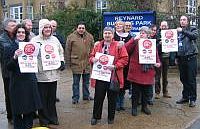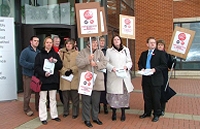Clear message to DG from BBC staff
Thousands of BBC staff today showed their opposition to cuts planned by Director-General Mark Thompson.
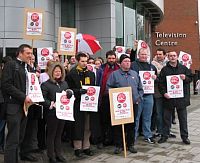
|
| Staff protest at Television Centre, West London |
Outside many BBC buildings groups of staff gathered at lunchtime to show their support for the union campaign, and at a meeting in London senior union figures warned that many of Thompson's plans could wreck the BBC's ability to deliver top-quality public service broadcasting (PSB).
The campaign day, organised by BECTU, NUJ, and Amicus, coincided with the publication of a government Green Paper on the future of the BBC, which, to the relief of unions and supporters of PSB, indicated that the licence fee would not be scrapped.
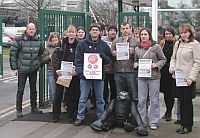
|
| Staff at Elstree, home of Eastenders |
At the London meeting, Jeremy Dear, National Union of Journalists' General Secretary, accused the BBC, along with the government, of bowing to pressure from forces opposed to the concept of public service broadcasting, including many of the BBC's commercial competitors.

|
| The scene outside BBC Belfast |
According to Dear, the changes planned by Mark Thompson could damage the BBC's ability to deliver the services expected by licence-payers, undermining faith in the licence system and the Corporation's existence.
Luke Crawley, BECTU's lead officer for BBC members, speaking at the meeting, condemned Thompson's sell-off programme, under which BBC Broadcast, BBC Resources, and parts of BBC Worldwide, could be privatised. Disposal of subsidiaries which provided quality services to the BBC at value-for-money prices was not, he said, in the interests of licence payers.

|
| Protest at Southampton |
During March the BBC's staff unions are braced for a series of major announcements, including BBC Broadcast being officially put up for sale, drastic cuts and outsourcing plans in the BBC's support services, affecting more than 3,000 staff, and further cuts in programme departments and other areas to meet a 15% budget reduction.
When Thompson's BBC shake-up was announced last December, following four internal reviews commissioned by the new Director General on his first day in charge of the Corporation, unions accused him of buying off some of the BBC's most vociferous critics in an effort to impress the government and win a favourable Charter from 2007 onwards.

|
| The winter of discontent at Kingswood Warren! |
Although some of the Green Paper's proposals have been welcomed by unions, particularly the preservation of the licence-fee system for at least 10 years, other aspects - for example the call for significant increases in independent production - will have a direct impact on employment at the BBC.
Some proposals in the government document have been drawn directly from Thompson's blueprint for the BBC, for example a plan to cut back production capacity from 75% of programme output to 60%. The change is intended to create gaps in schedules for more independent productions, but has been seen by union observers as vindication of their original claims that Thompson's strategy on Charter Renewal was to avoid painful, government-imposed, compulsory changes by self-inflicting similar measures on a voluntary basis.
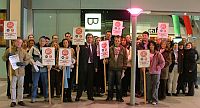
|
| Staff make their views known at Mailbox, Birmingham |
One of the unions' campaigning themes has been strengthened by the Green Paper's demand that the BBC should continue to drive the take-up of digital TV in the UK, while abandoning "ratings-chasing" and generating quality programming to fill the gap in public service provision that is opening up in the commercial sector.
The unions will be arguing that the BBC, weakened by cuts, and divided by privatisation, will be unable to rise to this challenge, and that the government's vision for the future of broadcasting needs a united, properly-staffed, and well-funded, Corporation to ensure its delivery.
|
Amended 4 March 2005
Amended 9 March 2005



